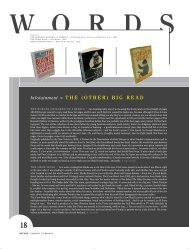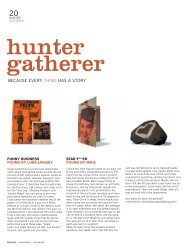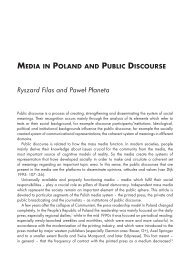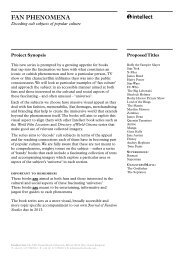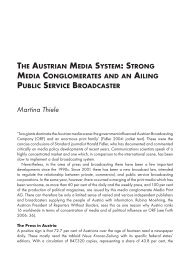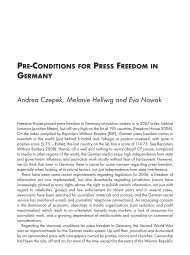Anthem - Intellect
Anthem - Intellect
Anthem - Intellect
Create successful ePaper yourself
Turn your PDF publications into a flip-book with our unique Google optimized e-Paper software.
<strong>Anthem</strong><br />
self-identification of the traditional kind that leans heavily on differences between<br />
Fortress Europe and its surrounding others, the West and the rest? 413 The conflict of<br />
interpretations has not reached any firm conclusion in this respect.<br />
Beethoven’s modification of Schiller’s lyrics was thus deemed to be both too specific<br />
(German) and too general (universal). Many European officials and politicians<br />
expressed a hope for some future ‘genius’ to be able to provide a new and acceptable,<br />
more properly European text in the main European languages. This will remain highly<br />
difficult due to linguistic and cultural differences within Europe. Meanwhile, in order<br />
to at all get the tune accepted by all European states, the compromise was to have it<br />
without words, which makes it difficult to actually sing it jointly, thus paradoxically<br />
annulling the original motivation behind an anthem in the first place: to occasion<br />
communal singing. The instrumental anthem silences the collective human voice that<br />
Beethoven found essential to introduce to convey his intended meaning of the ode,<br />
and which the whole idea of having a European anthem in many ways continues to be<br />
dependent upon in order to function as a ritual marker of collective identity. 414<br />
Esteban Buch concludes: ‘Thus, the European anthem will not be vocal music,<br />
nor instrumental music, but well a song where the lyrics is missing, an unfinished<br />
symbol.’ 415 This critical formulation may perhaps open up for a partial rescue of the<br />
anthem, as the lack of words gives the music a chance to transmit its message across<br />
linguistic barriers, in a kind of ‘universal language’, which is a widespread (though<br />
highly problematic) presupposition about music’s innate capacity. 416 It was previously<br />
argued that the open circle of the European flag also in a sense presented an unfinished<br />
symbol, inviting other actors to step in and fill it with shifting contents. The textless<br />
tune could likewise be used for karaoke, opening up a sonar space for singers to fill<br />
with expressive activity. 417 What from a critical perspective is an empty void may then<br />
simultaneously imply an invitation for participation. In any case, the original lyrics<br />
linger in the background for those who know a little bit about Schiller’s poem or<br />
Beethoven’s symphony, and at least the anthem title hints at happiness as a core value,<br />
coinciding with the desire and pleasure of the Europa myth.<br />
Even though the anthem has excluded so much of its original context in Schiller’s<br />
and Beethoven’s works, it is still full of tensions, paradoxes and contradictions, which<br />
Buch clearly points out. 418 First, the anthem is a musical translation of the universal<br />
values of joy and brotherhood, but is forced not to explicitly express those same values.<br />
Second, it is supposed to express collective European democratic principles but is the<br />
work of a former Nazi. Third, the anthem illustrates the rootedness of the EU symbols<br />
in the nation-state tradition, but also the wish to be different from this tradition and<br />
develop truly late modern and transnational symbols. Fourth, it is to incarnate the<br />
‘voice of the Europeans’ but with its silenced lyrics is impossible to sing. Only the<br />
music but not the lyrics have official status:<br />
179




